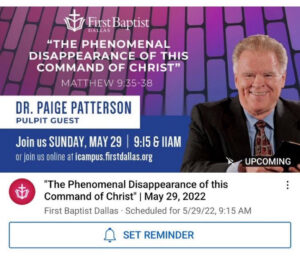Many of us are struggling to come to terms with the news that the Executive Committee of the Southern Baptist Convention has covered up abuse, maligned survivors, and even kept a secret list of 700-plus sex offenders for years.
In the aftermath of this atrocious exposure, the behavior of various SBC leaders has been discouraging and even appalling. We are hearing many sorrowful words, but are these leaders just crying crocodile tears? Will words ever be followed by action?

Megan Benninger
One harrowing example is Robert Jeffress of First Baptist Church of Dallas. He appeared on Fox News speaking about the horror of the report. He bragged about how his own church has a zero-tolerance policy toward abuse. He then ended his interview by calling for survivors to forgive their offenders — an audacious, inappropriate, tone-deaf request to make as a pastor representing the denomination that has plundered the souls of victims repeatedly.
The icing on this tasteless cake is that, just two days later, Jeffress hosted the disgraced Paige Patterson as a “pulpit guest” at his church.
Patterson is a man who was fired and stripped of his retirement benefits because he “lied to the board of Southwestern Baptist Theological Seminary about a rape allegation that came before him at another seminary, withheld documents from his previous presidency, and referenced attempting to ‘break down’ the victim of a more recent rape incident.”
 A second example of leadership absurdity is Johnny Hunt, who was arguably the most shocking abuser to appear in the SBC report. He is alleged to have sexually assaulted a younger pastor’s wife. He denies the allegations, as do the great majority of abusers when they are exposed. Regardless of his guilt or innocence, he should not be in ministry unless and until the matter is fully investigated and settled.
A second example of leadership absurdity is Johnny Hunt, who was arguably the most shocking abuser to appear in the SBC report. He is alleged to have sexually assaulted a younger pastor’s wife. He denies the allegations, as do the great majority of abusers when they are exposed. Regardless of his guilt or innocence, he should not be in ministry unless and until the matter is fully investigated and settled.
Despite resigning abruptly from the SBC’s North American Mission Board, he’s still slated to host the “Favored Women” conference in Gatlinburg, Tenn., this fall.
According to the SBC’s investigation, “it appears that nine people” who were on the secret list “remain in active ministry or connected to ministry.” Be assured the number is much greater than that. In my own small-town SBC church, a convicted child molester was employed as a pastor as well as superintendent of the church-run school over a period of 12 years.
How do men like this remain qualified to preach in any pulpit anywhere?
Besides the absence of a public database of offenders and enablers funded by the SBC, the answer also lies in the SBC’s complete lack of policies or records concerning ordinations. Most laypeople assume their pastor must have had some training in ministry, most likely a seminary degree. But that is not necessarily the case. The truth is that a local church can ordain anyone they choose, even if they have no formal training whatsoever. There are, in fact, zero qualifications to become ordained as an SBC pastor. One author on the subject aptly declared that, “Southern Baptist churches would ordain a ham sandwich.”
Worst of all, these ordinations are rarely, if ever, recorded anywhere beyond the local church’s records. So when a pastor is alleged to have abused a congregant or child, even if he has been convicted in court of the abuse, there is no reliable protocol for revoking his ordination.
“The truth is that a local church can ordain anyone they choose, even if they have no formal training whatsoever. There are, in fact, zero qualifications to become ordained as an SBC pastor.”
In 2019, I personally attempted to help get a confessed abuser’s ordination revoked. It was a frustrating and fruitless waste of time spanning months.
One survivor of this particular man’s abuse already had spoken to several board members of the SBC’s Ethics and Religious Liberty Commission over the years and had been advised to contact the church where her abuser had been ordained in order to have his ordination revoked. But when contacted, the pastor of the church, James B., had no record of the abuser’s ordination and refused to help. He recommended she contact a previous pastor, Dr. Cook, whom the survivor knew had been present at her abuser’s ordination ceremony at that church many years before.
This was where I entered the story as an advocate and helped reach out to Dr. Cook’s present church, where he is now a member but no longer a pastor himself. I was told that Dr. Cook, an elderly man in his 90s, was not willing to sign the affidavit provided by the survivor’s lawyer. Dr. Cook and his current pastor, Eric C., relayed that it was the responsibility of the originally ordaining church, which Dr. Cook had not been part of for many years.
So there we were. No one was willing to take responsibility.
At this hopeless point, the Pastor Eric C. of Dr. Cook’s present church offered to connect me to Travis Wussow of the ERLC. Within his initial response, Wussow explained: “An ordaining church does not have a routine obligation to monitor and evaluate the calling and qualification of every person the church has ordained.”
I followed up with several questions, but I never heard back from Wussow. I even re-sent the email. But crickets. I had been ghosted, even though Wussow had invited me to ask follow-up questions.
There wasn’t much more to say, I suppose. There was no record, no protocol, no recourse.
This must change. Pastors must be legitimized by some qualification process and their ordinations recorded in a systematic way.
Two databases are needed. One must be a third-party sourced database of alleged and convicted abusers as well as alleged enablers of abusers. It must not only be made available to churches but also to the broader public. Church leaders have proved they cannot be the keepers of the information. And laypeople deserve to have full access to the information as they choose a church to attend.
The second must be a database of ordinations and their current status, also made publicly available since offenders may seek employment in other denominations. The creation of these two databases could greatly reduce the problem of abusers remaining in pulpits in their current positions as well as seeking future ministry employment.
My husband and I run the baptistaccountability.org database. As two passionate individuals, over the past two years we have accomplished what the nation’s largest Protestant denomination has refused to do for years. We have created and maintained a publicly available database of abusers and enablers in Baptist organizations. We have a form on our website to accept entries from survivors and concerned citizens. On a single income, with five children to support (two in college), we risked our time, finances and reputations to keep people safe from known abusers in their churches.
But this wasn’t our job to do. SBC, step up to the plate, and do the work! It is your responsibility and your mess to clean up. Make the databases now.
Megan Benninger is a cult survivor, whistleblower, church abuse advocate and published poet. She and her husband are founders of Baptistaccountability.org, a database of abusers and enablers in Baptist organizations. She lives in South Central Pennsylvania with her husband and five children. Follow her work at churchtrauma.com or on Facebook @BaptistAccountability, Twitter @BAccountabilty, and Instagram @baptistaccountability.
Related articles:
Guidepost report documents pattern of ignoring, denying and deflecting on sexual abuse claims in SBC
What’s next for recommendations and reforms in SBC sexual abuse study?


